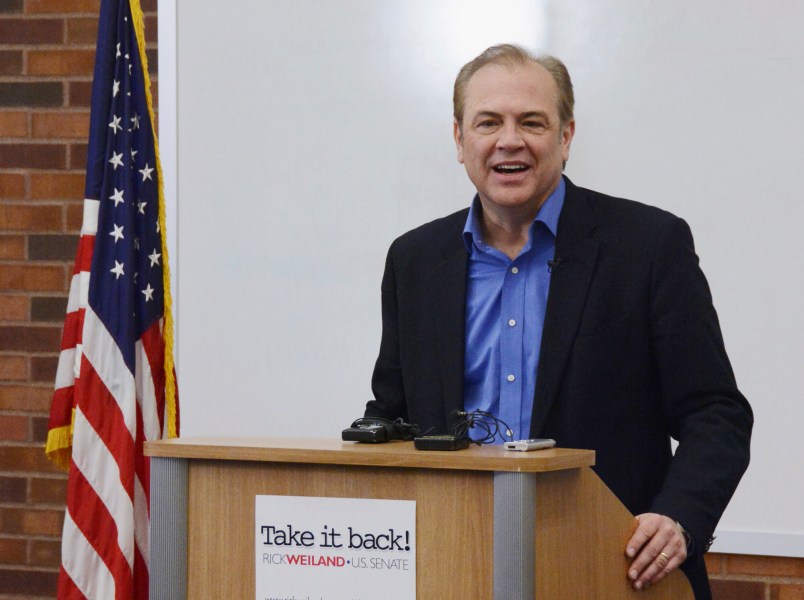Before Wednesday, Rick Weiland was simply the long-shot Democrat running in an open Senate race that Republicans are poised to claim.
Now he’s the long-shot Democrat who compared the Supreme Court’s decision to eliminate limits on aggregate campaign donations to a notorious ruling that justified slavery.
The South Dakota Senate hopeful told TPM in an interview on Thursday that’s consistent with the populist message he’s preached all along.
“The cornerstone of my campaign is how big money has gotten in the way of public policy and we need to take our country back,” Weiland said by phone.
He has a point. Splashed across the front page of his campaign website is a pledge to push for a constitutional amendment that would overturn Citizens United, the 2010 decision that allowed unlimited campaign spending by corporations and unions. The promise is also printed on the back of his business card. And virtually all of his emails to supporters rail against “big money,” a term he used more than a dozen times in his interview with TPM.
But none of those emails — or really any of Weiland’s campaign activities — attracted national attention until this week. With the Supreme Court’s decision in McCutcheon v. Federal Election Commission still fresh on Wednesday, Weiland’s campaign blasted out an email with a subject line that did not mince words: “Worst Ruling Since Dred Scott.”
“Today’s decision of the United States Supreme Court to strike down any real limit on the purchase of our democracy by big money may be the worst decision made by any Supreme Court since the Dred Scott case reaffirmed slavery in 1857,” Weiland said in the email.
He does not regret the comparison.
“Well, I mean the reality today is that this country is being turned into a plutocracy by just massive amounts of big money,” Weiland told TPM. “It’s stolen our government, it’s bought Washington, it’s getting in the way of people’s business and good public policy.”
The lone Democrat in South Dakota’s U.S. Senate race after the party’s top two choices passed on running, Weiland has been left to run a classic retail campaign. He’s already visited 285 of the state’s 311 incorporated towns (he noted that he’s “also been to a lot of unincorporated towns.”) and has held more than 100 town hall meetings.
Although he scored an endorsement from Sen. Elizabeth Warren (D-MA), national Democrats have been less than enthused by Weiland’s campaign. The seat being vacated by retiring Sen. Tim Johnson (D-SD) is widely regarded as a nearly automatic pick-up for Republicans. His most likely GOP opponent, former Gov. Mike Rounds, has lapped Weiland in fundraising.
To that end, his email on the McCutcheon decision was considered a gaffe for a candidate with a minuscule chance of actually winning.
None of the Republicans or independents running in the race’s crowded field had anything to say about the email. Neither did national Republicans. All of that might say something about Weiland’s chances, of course, but he said the response has been “really positive,” save for “a few snarky comments from a few folks.”
“I mean, I’m doing a lot of interviews like this,” he said. “People are interested in talking about the whole big money thing.”
Still, the comparison didn’t quite make sense to a lot of people. After all, what about Plessy v. Ferguson, which upheld the doctrine of “separate but equal” and was handed down by the high court nearly 40 years after Dred Scott? Or how about the 1944 case of Korematsu v. United States, which approved the forced internment of Japanese-Americans? Weiland places McCutcheon on the same level of infamy.
“You know, Dred Scott and Plessy and all the other decisions that have come down from the court that deny African-Americans or women or Japanese their fundamental rights to have their voices heard equally with their fellow citizens, [McCutcheon] was in that sort of class and that’s why I was so outraged,” he told TPM.
Weiland, a former aide to Tom Daschle who ran unsuccessfully for Congress in 1996 and 2002, insists that this message will resonate with South Dakota’s largely conservative electorate.
“I have tried to tie everything to what I’ve called the scourge of big money in public policy,” Weiland said.
The Affordable Care Act, he said, would have been better if “the insurance companies and the drug companies hadn’t had so much to say what was going to be in the final legislation.”
“And I can tie it to agricultural policy. I can tie it to energy policy,” Weiland said with confidence. “All of our advancements as a democracy, as a country and the laws of the land, are connected to the sacredness of ‘one person, one vote.'”
For an attention-starved candidate who’s spent much of the campaign warning about the Kochs and Sheldon Adelsons of the world, the McCutcheon decision was teed up perfectly for Weiland.
“This is definitely in my wheelhouse,” Weiland said. “It’s the reason I’m running, and the reason I’m so outraged.”






